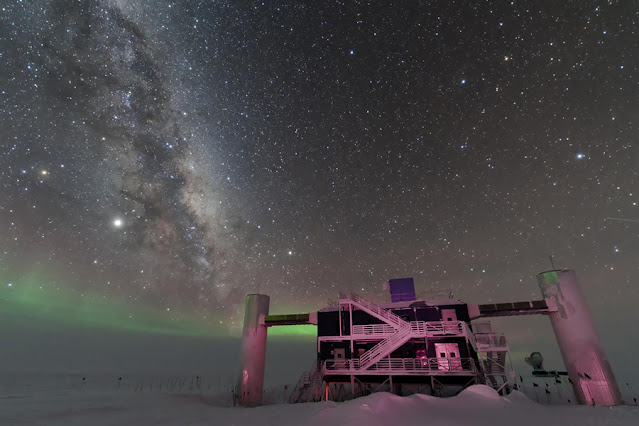IceCube Neutrino Observatory in Antarctica
IceCube is the largest neutrino observatory in the world and consists of over five thousand optical detectors draped through a cubic kilometer of ice at the geographic South Pole. IceCube was built specifically to study cosmic neutrinos that come from outside our own solar system. Thanks to the IceCube Neutrino Observatory, scientists have identified several types of cosmic structures that produce neutrinos. A new study estimates for the first time how likely a neutrino is to come from each source type, helping physicists understand more about these ghostly particles and how they are created in the universe.
Neutrinos are tiny, nearly massless elementary particles that travel through the universe at almost the speed of light. They were first made during the Big Bang and are produced today by fusion reactions inside stars (including our own Sun), by supernovae explosions when massive stars die, and by the violent transformations of matter and energy that happen around black holes.
The IceCube Neutrino Observatory, or IceCube as it is commonly called, has detected over 100 cosmic neutrinos since its first full science run in 2011, and scientists have figured out where a few of them came from: a flaring blazar, a nearby Seyfert galaxy, and a tidal disruption event, the term for when a star wanders too close to a supermassive black hole and gets gobbled up by it.
IceCube is operated by the University of Wisconsin-Madison and supported by the National Science Foundation.
Learn more:
https://antarcticsun.usap.gov/science/4713
Story Credit: National Science Foundation (NSF)
Image Credit: Benjamin Eberhardt
Release Date: March 14, 2022
#NSF #Space #Astronomy #Astrophysics #Earth #IceCube #Neutrino #Observatory #SolarSystem #Stars #MilkyWay #Galaxy #Cosmos #Universe #Research #Science #Technology #Engineering #AmundsenScott #AuroraAustralis #SouthPole #Antarctica #UnitedStates #STEM #Education

No comments:
Post a Comment